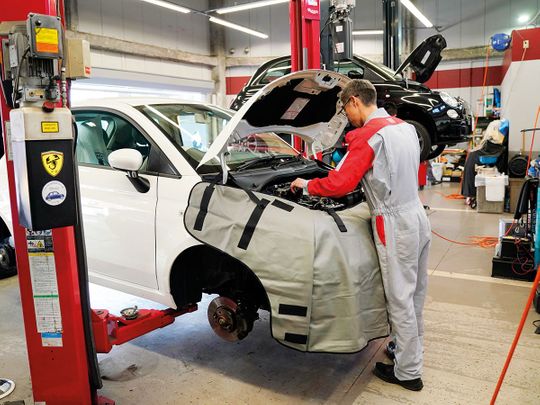
Dubai: Another merger in the global auto industry? Seems so like something from the last decade.
At a time when car manufacturers have been busy picking up hot-shot tech startups — or at least enter into alliances with them before anyone else did — Renault’s decision to seek a merger with FCA (Fiat Chrysler Automobiles) has a touch of the old school about it.
Because these days, the auto industry is trying to set the agenda for the next generation, which includes electric-powered and self-driving cars and less room for those on fuel.
That’s why all the talk about deals have involved tech firms — Google and its Waymo are right in the thick of it — than other car brands. Pick any global carmaker and it would have gone through multiple tech-fuelled deals, even committing to app brands in car hiring or any such service-on-the-go. In fact, last February, Daimler and BMW had a 1 billion euro tie-in to develop a range of “mobility services”.
In his latest conference call, the BMW CEO Harald Kruger dropped the “tech” word in just about any mention of the future, the immediate and the distant. “2019 will be another challenging year — our environment remains volatile and dominated by uncertainty,” he said. “Nevertheless, we will continue our positive business development — as we systematically prepare for the technological challenges of the future.”
But even in tech-obsessed times for the auto industry, a plain-vanilla merger between manufacturers would still make sense, according to senior industry source here.
“Manufacturers have been reporting significant drops in profitability and there’s nothing to suggest matters will improve,” he said. “Even a slight decline in sales volumes will translate into huge losses for the operations. That can no longer be sustained, not when these plants cost so much money to build.
“The only option is to prepare for electric and autonomous driving. Manufacturers need to readjust to a new generation of vehicles where there will be 40 per cent less components than in fuel-driven cars. If a merger helps bring about such a change, there’s no reason why manufacturers shouldn’t pursue it. At least, there’s no harm trying.”
If the Renault-FCA deal gets through, it would at the very least please French carmaker Renault’s former supremo — and now disgraced — Carlos Ghosn no end.
Because Ghosn was one of the original voices prompting carmakers to pursue continent-straddling alliances, and thus raise better cost efficiencies and other benefits from doing so. And he managed to show the way forward, first aligning Renault’s interests with Nissan and then Mitsubishi. And through the years, the three-way alliance did have its moments, until the Ghosn saga blew up.
So, can Renault hope to do a repeat performance with FCA? Fiat Chrysler Automobiles has been in the market for some time now for a possible deal, with repeated mentions made about General Motors. But nothing came out of it.
Now, with Renault it has a chance to get back into the limelight — a deal would make the combine the third largest manufacturer in the world after Volkswagen AG and Toyota Motor Corp. (As per the outlined plans, the Renault-FCA coming together will have no place for Nissan and Mitsubishi. Renault will maintain a separate partnership with the two Japanese manufacturers.) Can a Renault-FCA deal work? “There’s no reason why it shouldn’t — Carlos Ghosn got a lot of things right in his career,” said the auto industry source. “His original premise that manufacturers should match strengths still applies. That he has been ousted from Renault and Nissan doesn’t mean he was wrong.”
Not to forget that Italy’s Fiat itself built up a fairly successful merger with Chrysler, done after the 2008-09 Great Recession upended America’s car industry. FCA benefited immensely from the subsequent pick-up in demand, something that went on to last for nearly five years. Chrysler played its part, helping out with the Jeep Wranglers and Dodge RAM trucks. (Those Super Bowl ads did their part too — remember the one with the Vikings?).
In the UAE, Chrysler has been a traditionally strong brand, through the Cherokee and Jeep marques. Renault has emerged as a hyper competitive make in the mid-market category, while Fiat until now has tended to go niche.
A FCA deal would also allow Renault to look beyond its Nissan distractions. The latter has clearly stated it wants no changes to the current structure and ruling out a full-fledged merger with Renault.
In the recent past, there were other deals that went on to hit their groove with ease. The Chinese manufacturer Geely is doing all right with Sweden’s Volvo, which it acquired in 2010. Jaguar has had some good years under India’s Tata Motors.
Even the other French carmaker Peugeot came up trumps after buying perpetual lossmaker Opel/Vauxhall from General Motors and then immediately reporting a profit.
Renault-FCA could be the latest to see benefits from a coming together.








